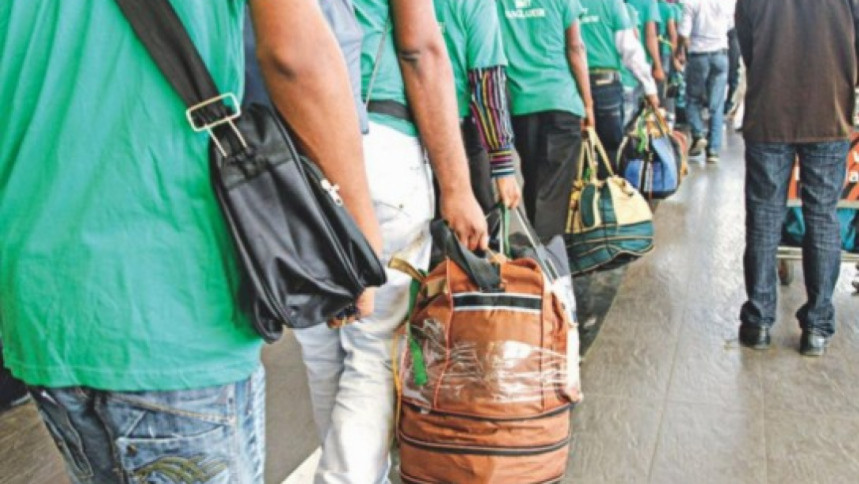5 Migrant destinations: Pandemic shoots down labour export

Bangladesh's efforts to send workers to five countries have suffered a blow as those nations adopted restrictive measures before and during the Covid-19 pandemic.
Steps taken by Middle Eastern countries Bahrain and Iraq before the pandemic had made it difficult for Bangladesh to send workers there.
Kuwait, Brunei and African island nation Mauritius have taken some measures caused by the pandemic, leading to a decline in the recruitment of foreign workers.
Two of the five countries imposed restrictions on issuance of demand letters for labour recruitment and prioritised hiring locals. Also, the labour market in one of the five nations "reached saturation". All these contributed to the downtrend in the export of Bangladeshi manpower to these countries.
Insiders in the manpower export sector said Bangladesh's diplomatic efforts to regenerate these labour markets were falling short of their expectations.
The country sent about 6.17 lakh workers abroad last year. Only 2,091 or 0.33 percent of them went to these five countries, according to data of the Bureau of Manpower, Employment and Training (BMET).
In 2017, Bangladesh sent 10.08 lakh workers abroad for employment. Of them, 87,270 were hired by the five countries, shows BMET data.
The five nations recruited nearly 10 percent Bangladeshi migrant workers from 1976-2019. During this period, the country sent 1.28 crore workers abroad.
Last year, Saudi Arabia alone hired 4.55 lakh Bangladeshi workers.
Officials at the Bangladesh missions in those five countries said approval of demand letters by them came down to almost zero in 2020 when air communications between Bangladesh and those nations remained snapped due to the pandemic.
Although the situation started improving in the middle of last year, the demand letter approval rate remained low, they added.
At present, Kuwait, home to about three lakh Bangladeshis, is allowing foreign workers, including Bangladeshis, for public projects only, said an official.
This measure was adopted mainly in line with the Gulf country's steps taken to contain Covid-19 spread, the official said, preferring not to be named.
The official said Kuwait imposed a restriction on issuance of demand letters and it remained in force till July last year due to the pandemic. Besides, it suspended air communications with many countries, including Bangladesh.
Abul Hossain, labour welfare counsellor at the Bangladesh embassy in Kuwait, said they have started approving demand letters again. He expressed optimism that labour recruitment from Bangladesh would reach the pre-pandemic level soon.
An official at the Bangladesh embassy in Bahrain said the Gulf country had stopped issuing employment visas to Bangladeshis in 2018.
Although the Bahrain authorities did not specify reasons for this, they voiced concern at times over a large number of undocumented Bangladeshi workers staying there, said the official, wishing anonymity.
"They wanted to reduce the number of undocumented Bangladeshis first before issuing new visas."
He said there were about 67,000 undocumented Bangladeshis in Bahrain in 2018. The number has now come down to about 25,000, thanks to regularisation of foreigners under the Bahrain government's initiatives.
M Tauhidul Islam, labour welfare counsellor at the Bangladesh embassy in Manama, said that they were working to resume recruitment of Bangladeshi workers.
An official of the Bangladesh mission in Brunei said the Southeast Asian country recently completed some mega projects. The job market in Brunei has now "reached saturation".
About 15,000 to 20,000 Bangladeshis live in the country now, the official said.
In Iraq, the authorities had stopped issuing employment visas to Bangladeshis in 2019, said sources.
Although there was no official announcement in this regard, the authorities voiced concern over the "large number" of Bangladeshi workers there, they said.
According to the sources, political instability in the Arab country is another reason for the low rate of recruitment of foreign workers.
About 65,000 Bangladeshis now live in Iraq, said an official.
In Mauritius, many companies reduced their quota for foreign workers amid the pandemic, said an official at the Bangladesh mission there.
Besides, the government there has given priority to hiring locals who became jobless during the pandemic, he said.
However, a small number of Bangladeshi workers have landed jobs in the country since November last year after the resumption of air communications, the official added.
Sector insiders said the government needs to make effective diplomatic efforts and ensure an ethical recruitment process to regenerate labour markets in those five countries.
They said the government also has to look into whether the job seekers are securing jobs as per contract.
Fakhrul Islam, president of Recruiting Agencies Welfare Organisation of Bangladesh, said labour recruiting countries tend to pick workers from other countries if the number of migrant workers from a particular nation goes up significantly.
However, a manpower exporting nation can get priority over the others in such a situation through strengthening its diplomatic efforts, he said.
Fakhrul said Bangladesh previously did not make much efforts in this regard compared to what it did to receive remittances from abroad.
Shakirul Islam, chairperson of Ovibashi Karmi Unnayan Programme, a migrant rights group, said labour-receiving countries are now more concerned about human trafficking as it harmed their image previously.
"Once the ethical aspects in the recruitment process is ensured, Bangladesh will be able to attract the labour-receiving countries," Shakirul said.He said efforts should be made to look for new job markets.


 For all latest news, follow The Daily Star's Google News channel.
For all latest news, follow The Daily Star's Google News channel. 



Comments